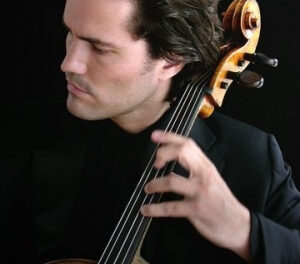Greg McCallum: Voyage à Paris, solo piano works by Debussy, Franck, Messiaen, Poulenc and Ravel; MSR Classics © 2009; CD available throughhttp://www.msrcd.com/1233/1233.html $14.95.
After Greg McCallum wrapped up his first musical documentary for MSR classics, Southern Quilt, he set out on a new adventure, a dream held by many; the keepsake and gift to us was a new recording, Voyage à Paris. Immersing himself in the art, the cuisine, the language, and the landscape, he lived and prepared himself in the very neighborhood where great composers, painters, and writers thrived in fin de siècle Paris. Choosing some of the most beautiful works for solo piano, the collection features works by Claude Debussy (1862-1918) whose “Prélude à l’après-midi d’un faune” forever changed the world of Western music; Olivier Messiaen, father of the avant-garde; César Franck (1822-1890); Francis Poulenc, prominent member of Les Six; and Maurice Ravel.
The centerpiece of the album is the monumental Prelude, Chorale and Fugue (1844) by César Franck (1822-1890). Born in Liège, Franck lived and worked as composer, teacher, and organist (mainly at Ste. Clotilde) in his beloved Paris, where he cut loose from an over-zealous father and fully developed as an artist. His most substantial output during his golden years, including this cycle, reflects a richly infused improvisatory technique and chromatic palette that would influence his followers and students. McCallum’s scintillating performance reveals the emotionalism and counterpoint that Franck so skillfully married. And this is just a warm up.
In the well-written liner notes, McCallum describes the following tracks by Ravel as “pinnacle.” The composer was not a virtuoso at the keyboard and, surprisingly, at the instigation of Ricardo Viñes, he set out to pen the most difficult piano work on the planet. Ravel’s early works were influenced by Debussy, but in this case he wove shimmering ninths and elevenths into well-defined structures that set his work apart. Gaspard de la Nuit(1908), based on three poems by Aloysius Bertrand (published posthumously in 1842), is exquisitely crafted; each of the three movements characterizes the descriptive narrative. “Ondine,” says McCallum,” is one of the greatest water tone poems of the Impressionist period.” With the relentless sound of a church bell, “Le Gibet” is a bone-chilling portrait. But the real test for the performer, “Scarbo” is devilishly tricky. McCallum adeptly turns Ravel’s spell-binding compositional response into a thrilling experience that would rival Stephen King’s novels.
McCallum closes with “Regard de l’Esprit de joie” from Olivier Messiaen’s tour de force,Vingt Regards sur l’Enfant Jésus (1944). Written for his second wife, Yvonne Loriod, a brilliant pianist, the composition presents a myriad of technical challenges. From relentless motoric drive, fiery runs, and cascading sixths, this piece never lets up. Boldly capturing every coloristic nuance, McCallum’s performance is powerful. Messiaen would surely smile!
McCallum also includes two Poulenc Improvisations, both songs without words. Improvisation No. 15 in C Major (1959), titled “Hommage à Edith Piaf,” tips the hat to France’s most popular twentieth-century singer. His musical language is direct but sensuous; lyric and elegant. Of course, no recording of this scope would be complete without Debussy Préludes. You will find these equally magical. And if you hear a bit of Gershwin in the final tracks, you won’t be alone. He was enchanted by French composers, particularly Ravel; the admiration went both ways.
Hands down, this is my pick for favorite 2009 piano recording. So take out your Atlas, pour yourself a glass of Piesporter* and get ready for a winter get-away. Even better, go hear McCallum in recital at Meredith College, Sunday, January 17, at 8:00 p.m. For details, see our calendar .
*wine suggested by Nancy A. Stolfo-Corti, The Other Side of Tuscany











